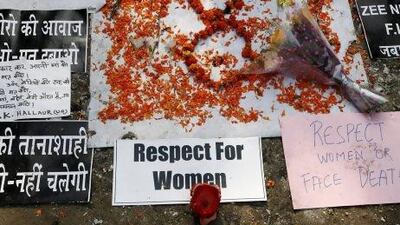NEW DELHI // A magistrate yesterday banned media and the public from the trial of five men accused of a gang rape and murder that has convulsed India.
The ban came after rowdy scenes in a courtroom in south Delhi before the men made their first appearance to hear the charges against them.
"Keeping in view the sensitivity of this case that has risen, the proceedings including the inquiry and trial are to be held in camera," magistrate Namrita Aggarwal said before ordering anyone not connected with the case out of the courtroom. The men then stepped out of a blue police van that had brought them from Tihar jail, and passed through a metal detector before walking into the court with their faces covered.
Along with a 17-year-old, the five are accused of raping a 23-year-old physiotherapy student when she boarded their bus after going to the cinema in New Delhi on December 16. She died two weeks later in a Singapore hospital.
The men are charged with murder, rape and other crimes that could bring the death penalty. The teenager is expected to be tried in a juvenile court, where the maximum sentence is three years in a reform centre.
The magistrate said the next hearing would be on Thursday. She did not say when the case would go to trial in a separate, fast-track court set up after the attack.
Earlier, an argument broke out in court when a lawyer offered to defend the men. He was shouted down by colleagues who said they did not deserve representation, given the brutality of the crime.
"The five accused persons deserve not less than the death penalty," public prosecutor Rajiv Mohan said. The court has yet to assign them defence lawyers or legal aid, he said. Mr Mohan said last week that a DNA test confirmed that the blood of the victim matched bloodstains found on the clothes of all the accused.
On Sunday, two of the men offered to become "approvers," or informers against the others, in return for lighter sentences.
The victim's boyfriend described in a television interview last week how the couple were attacked on the bus for two and a half hours before being thrown on the side of the road, where passersby ignored them and police debated jurisdiction issues before helping them.
Indian law prohibits the disclosure of victims' identities in rape cases. While neither the boyfriend nor the TV network, Zee News, identified the woman, police opened an investigation into Zee News after the interview was broadcast, on the ground that too many details about the attack had been revealed.
But the victim's father yesterday repeated his wish that she be identified and said he would be happy to release a photograph of her. "We don't want to hide her identity, there is no reason for that. The only condition is it should not be misused," he said.
The attack has led to calls for tougher rape laws and reforms of a police culture that often blames rape victims and refuses to bring charges against accused attackers. The nation's top law enforcement official said the country needs to crack down on crimes against women.
Since the attack, New Delhi has set up five fast-track courts to handle sexual assault cases, which often get bogged down for years. Indian courts are notorious for delays, with millions of cases pending across the country.
Yesterday, the chief justice asked courts in Indian states to also set up fast-track courts to try crimes against women.
* With additional reports from Reuters

